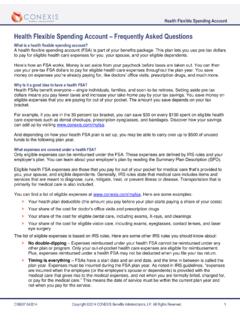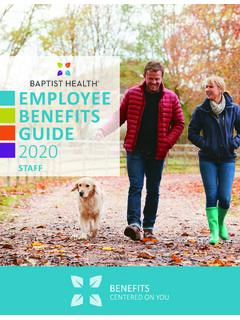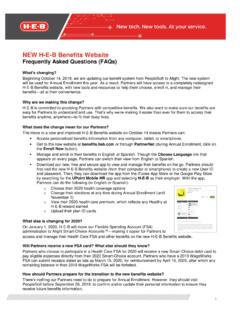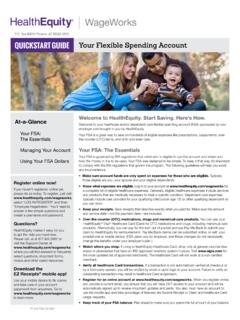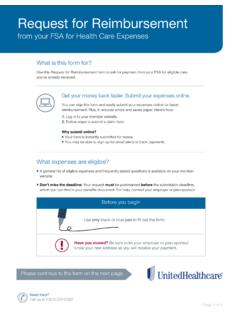Transcription of Flexible Spending Accounts (FSA) Frequently Asked …
1 Flexible Spending Accounts (FSA) Frequently Asked Questions 1) How can I benefit from enrolling in a Flexible Spending account (FSA)? An FSA lets you use pre-tax dollars for certain eligible medical and dependent daycare expenses. By setting aside money from each paycheck, you pay less in taxes and have money available when you need it to pay for covered services. * There are two types of FSAs: * Health care FSA: used to reimburse out-of-pocket medical expenses incurred by you and your dependents * Dependent care FSA: used to reimburse expenses related to care of eligible dependents while you and your spouse work 2) How can I determine if I will have enough out-of-pocket expenses to make a health care Spending account worthwhile?
2 Even if you have medical, dental and/or vision benefits, you still may be responsible for expenses that are not covered by your plans, such as: copays/deductibles; eyeglasses; contact lenses; saline solution; certain over-the-counter drugs allergy and cold medicines, antacids and pain relievers; chiropractic treatment; orthodontia and dental work. Your FSA works to fund these expenses on a tax-free basis. Our easy-to-use FSA Savings Calculator can show your projected tax savings based on the anticipated expenses you input. 3) Where can I find a list of eligible and ineligible expenses for reimbursement? You can view Eligible/Ineligible Expenses for both health care and dependent care Accounts on or via the District s Benefits web site: Please note that the IRS may modify the list of eligible expenses periodically.
3 If you are unsure whether an expense is eligible or not, please contact UHC Customer Care or refer to the FSA plan document 4) Are over-the-counter (OTC) drugs and items eligible for reimbursement? Internal Revenue Service (IRS) regulations allow reimbursement of certain OTC drug expenses. A list of examples of eligible and ineligible OTC items is available on or via the District s Benefits web site: 5) How does contributing to an FSA reduce my taxes? Contributions to your FSA come out of your paycheck before any taxes are taken out. This means that you don't pay federal income tax, Social Security taxes, and (in most cases) state and local income taxes on the portion of your paycheck you contribute to your FSA.
4 Our easy-to-use FSA Savings Calculator can show your projected tax savings based on the anticipated expenses you input. 6) How much should I contribute? You should contribute the amount of money you expect to pay out of pocket for eligible expenses for the plan period. The annual contribution limits associated for each account are: HEALTH CARE account (HCA): $500 minimum; $3,000 maximum DEPENDENT CARE account (DCA): $500 minimum; $5,000 maximum Note: (DCA allows $2,500 if married and filing separate tax returns) * You should consider: * Last year's medical and/or dependent care expenses * Any medical or dental care costs you foresee that might not be covered under your health care plans ( deductibles, co-payments, over-the-counter drugs) * Any changes in your family status that might have an impact on your medical/dental or dependent care expenses 7) How much will I really save on my health care expenses?
5 Depending on your individual income and tax filing status, you could save as much as 20-50 percent on eligible health care services by using an FSA. 8) Wouldn't I save more by just taking a deduction on my income tax? According to the IRS, only medical and/or dental expenses that exceed percent of your adjusted gross income can be deducted from your income taxes. Most people do not have expenses high enough to qualify for this deduction. For work-related dependent care expenses, the tax credit amount is determined by applying a percentage to your total dependent care expenses. According to current tax structure, generally the tax credit is more beneficial than a dependent care Spending account if your family income is under $25,000.
6 Keep in mind that contributions for an FSA are taken out of your pay before taxes are applied, thus reducing your gross salary and your taxable income. Talk to your accountant or financial planner for more assistance. 9) At the end of the year, if there's unused money in my FSA, do I get to keep it? No. According to the IRS's "use it or lose it" rule, if you do not use all the money in your FSA for expenses incurred during the plan year, you will forfeit the unused balance. Your unused balance cannot be carried over into the next year. If you are unsure of how much to save, be conservative. You can make the most of your FSA by carefully planning your yearly expenses and using to review your claims history, account balance and filing deadlines.
7 10) How do I submit a claim to get reimbursed from my FSA? a. Fill out a Flexible Spending account (FSA) claim form, available on or All dependent care claims must be submitted via claim form. b. If you have both medical coverage and a health care FSA through UnitedHealthcare, The District offers auto-rollover (flex credits) and the ability to manage it online at This automatic claim filing process allows claims for medical, pharmacy and dental copayments are automatically submitted for reimbursement, practically eliminating the need to submit manual claims for these types of services. In either case, you can receive a reimbursement check, or direct deposit have funds deposited into the bank account of your choice.
8 11) Can I request FSA reimbursement for services I received before the plan year begins if I'm not billed until after the plan year starts? According to IRS guidelines, a qualified expense is "incurred" at the time the service is provided, not when you are billed or when you actually pay for this service. Therefore, you can only file claims for eligible expenses incurred during the same plan year. 12) Can I change my election or stop contributing money to my Spending account at any time throughout the year? Federal regulations state that once you have designated the contribution amount, you cannot change your decision throughout the year unless you have a valid life status change event.
9 Your employer can provide you with a list of family status changes that allow you to alter your original account allotments. 13) Can I transfer money from my health care FSA to my dependent care FSA or vice versa? The health and dependent care Spending Accounts are two separate benefit plans. Per IRS regulations, you cannot transfer money between the two Accounts . 14) Can I use a dependent care FSA for elder care? You can use the Spending account for eligible daycare expenses so that you (or you and your spouse) can work if: a. You are responsible for at least 50 percent if the support of an elderly parent or any person living with you who is physically or mentally incapable of self-care.
10 B. This person is noted on your income tax statements as a legal dependent. You also can use the dependent care Spending account if the elder care is needed because you work and your spouse is a full-time student. 15) If I have someone caring for my children in my home instead of at a day care facility, do these expenses qualify for reimbursement from a dependent care FSA? Yes. You can include wages paid to a babysitter in or outside your home if the services are necessary in order for you (or you and your spouse) to work. Expenses also will qualify for a dependent care FSA if you work and your spouse is a full-time student.



